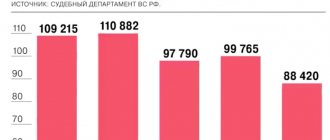Enforced debt collection is implemented using various legal mechanisms. Bailiffs not only try to determine the real income of the debtor, seize accounts and vehicles, but also search for other property belonging to him, including real estate. In 2021, foreclosure on the debtor's only home is almost never carried out, since such an action would deprive the citizen of the right to housing. However, there is an exception to this rule.
The procedure for foreclosure on real estate
If the debt is not repaid, the creditor may file a lawsuit (or apply for a court order). After the decision is made, he receives a writ of execution and submits it to the bailiff service at the location of the debtor in order to collect the debt forcibly.
The bailiff issues a resolution to initiate enforcement proceedings on the loan. The debtor will have a period of five days to voluntarily fulfill his obligation. If this is not done, the forced collection procedure begins.
To collect funds from the debtor, cash accounts are primarily used. If they are absent or there is insufficient money for them, the FSSP employee begins a search for other property, through which it is possible to ensure payments to the creditor.
The bailiff forecloses on real estate only if it is impossible to obtain compensation from other property. Article 69 of Federal Law No. 229 “On Enforcement Proceedings” establishes that such a procedure represents a direct seizure and subsequent sale of objects.
The debtor must provide the bailiff with all information about the real estate objects he owns. In practice, this rule is practically not implemented, so the contractor, to obtain the necessary information, sends requests to the tax authority, as well as to Rosreestr. After the answer, it becomes obvious what real estate the debtor owns.
Collection is made in the following order:
- search for property through sending inquiries . The bailiff needs to determine what property the citizen actually has, what can be used to pay off the debt, and what cannot be sold;
- seizure of identified property . This measure is necessary to ensure that the debtor does not sell the objects and does not hide the income received from the bailiff. The seizure of real estate prohibits any transactions with it. The restrictive measure is registered in Rosreestr and transactions are simply not carried out, since the system does not allow this;
- putting up real estate (property) for auction . Auctions allow anyone to purchase property. In practice, objects are sold at slightly lower prices than they actually cost on the market.
Before a building, structure or site is put up for auction, it will be assessed. If the object is not sold immediately, then the price for the next stage of the auction is reduced. If the bidding is not successful, then in the end the claimant may be asked to take ownership of the object to pay off the debt, at a minimum price.
Link to document: Federal Law No. 229-FZ of October 2, 2007 “On Enforcement Proceedings”
Can bailiffs take away housing and evict
For debtors, the issue of eviction from their only apartment due to debt to a creditor is relevant.
Based on legal practice, resorting to such a harsh penalty is necessary in exceptional cases:
- the amount of debt on loan obligations has reached large proportions, exceeding the cost of the housing itself;
- if the borrower’s personality is regarded as a willful defaulter.
Grounds not allowing eviction:
- the only housing. This means not only the property owned, but also the fact that the borrower and his family have absolutely no place to live;
- minor children living with the debtor in the only home.
Eviction in fact differs from the procedure for seizure. The eviction procedure provides for a specific goal - the sale of property at auction in order to pay off the debt or transfer it to the creditor.
Can real estate always be foreclosed on?
The bailiff will not collect the debt through the sale of real estate if it is possible to obtain funds otherwise.
For example , if you have a bank account, securities, transport and their sufficient value to pay off obligations, the real estate may not be touched.
At the same time, foreclosure is not applied to the debtor’s only home (Article 446 of the Code of Civil Procedure of the Russian Federation). So, if housing is used for the residence of the debtor himself, as well as his family, then its seizure is a violation of the right to housing, that is, a violation of constitutional law and legal norms, which is unacceptable.
The land plot on which the debtor’s only residence is located is also not subject to recovery. This is due to the fact that the land always follows the fate of the structure (Article 552 of the Civil Code of the Russian Federation, Article 35 of the Land Code of the Russian Federation).
In fact, non-residential real estate can always be sold within the framework of enforcement proceedings, but residential real estate - only when it is not the only one for the debtor and his family. However, there is an exception to this rule.
Download for viewing and printing:
• Article 446 of the Code of Civil Procedure of the Russian Federation
• Article 552 of the Civil Code of the Russian Federation
• Article 35 of the Land Code of the Russian Federation
Example No. 2. “Victim of fashion” or is it possible to live in an apartment
You keep up with the times and decide to move. You wished to move from your grandfather’s old “Khrushchev” apartment, inherited, to new fashionable apartments in the LOFT style, located in one of the former industrial zones of Moscow. Commendable!
But there is one nuance - according to current legislation, apartments are non-residential commercial real estate, and not residential premises. Perhaps you will say: “how come, you can live in them!” And you will be right in your own way.
Nobody forbids you to live in them, but you won’t be able to make a permanent registration in your apartment, you will only be given a temporary one.
Due to the fact that apartments are not residential premises, they are subject to fewer requirements, including those related to social infrastructure. But they are also not covered by property immunity.
This means that if you do not have enough cash or other property to fully repay the debt to creditors, then during bankruptcy your apartments will be put up for sale. Even if you have nowhere to live!
Moreover, the sale of apartments to cover debts to creditors is possible - both by a bailiff at the stage of enforcement proceedings, and by a financial manager during bankruptcy proceedings.
Foreclosing on the only home
In some cases, it is still possible to foreclose on your only home. We are talking about a mortgage, that is, in those situations where an apartment (or a residential building) is the subject of pledge (clause 1 of Article 446 of the Code of Civil Procedure of the Russian Federation).
In case of bankruptcy of citizens, the situation is similar. The Supreme Court of the Russian Federation confirmed this position and indicated that foreclosure is possible on a single residence, even if it was not the subject of a pledge. You can read more about the signs of bankruptcy of an individual in this article.
Previously, the debtor could sell other real estate, leaving in ownership an object that was regarded as “luxury”. The courts of previous instances considered that it was impossible to foreclose on such an object, but the Supreme Court assessed it differently and decided that only living space that is vital for the debtor’s residence is not subject to foreclosure. But a luxurious mansion cannot be classified as such an object, so it can be sold as part of debt collection, with the provision of a minimum living space to the debtor.
What cannot be restricted
When applying for foreclosure, there is a list of items that cannot be foreclosed on:
- Personal belongings of the debtor: clothes, shoes, furniture, food, equipment necessary for everyday life.
- Pets, livestock, seeds for sowing.
- Items necessary for the debtor to carry out work activities.
- Items belonging to third parties.
- Awards, medals.
- Fuel for space heating and cooking.
Practical features and problems
Quite often, the debtor’s only housing is an object that clearly exceeds his needs. For example, a person with a debt of two million rubles lives in a private house in the city center with an area of 200 square meters and a cost of 20 million rubles. Obviously, such real estate is more than the minimum a person needs to live.
In this case, the house clearly exceeds the value of the existing debt. The amount from its sale would be enough for the debtor to purchase other housing and to pay the creditor. But the possibility of selling the property and purchasing other housing is not yet possible in practice.
Firstly , in municipalities there is often simply no available housing stock. At the time of sale of housing and before purchasing a new one, the debtor and his family members must live somewhere. The solution could be the provision of a municipal apartment, but they are not available as such, at least in the public domain.
Secondly , there is simply no clear legislative mechanism for such actions. It is not yet clear what the difference in the cost of existing housing and the one needed for living should be to implement the procedure, how to take into account the area of residence, infrastructure, cadastral value and other parameters.
However, the sale of a single residence at auction is permitted if it is the subject of a pledge. And here a certain contradiction arises. On the one hand, the right to housing is also violated, but on the other, the pledge agreement is a voluntary transaction, the conditions of which must be fulfilled.
Example #1 is probably the most common. Mortgage
You bought an apartment on credit with a mortgage. For those who didn’t know, “mortgage” is not the name of a loan product for purchasing a home or other real estate, but a way to ensure the fulfillment of a loan agreement.
In this case, by pledging the acquired real estate. And suddenly you stopped paying the bank the money owed to it. This exception is expressly stated in the list of property that cannot be foreclosed on.
The bank has the right to terminate the loan agreement and take away your property, including your only home, if it is the subject of a mortgage, to pay off loan debts.
But this does not mean that if today you have not paid the bank the next installment under the loan agreement, then tomorrow you will be asked to “leave with your things” from your only home. Based on current judicial practice, the bank does not have the right to apply to the court to terminate the loan agreement and foreclose on the mortgage if:
- the loan balance is less than 5%;
- the period of overdue payments is less than 3 months.
In this example, only the bank that issued you a loan secured by property has the right to initiate a process for judicial termination of the loan agreement with the subsequent seizure and sale of the pledged property.
How to challenge foreclosure on your only home
If foreclosure is carried out on housing, which is actually the only one for the debtor, you need to act depending on the circumstances. So, if the procedure was initiated by a bailiff, then the procedure is as follows :
- obtain a resolution to foreclose on property. The bailiff will send it by mail to the debtor after delivery. If the document has not been received, you can apply for it in person or apply for issue by mail;
- study the text of the resolution;
- prepare the text of the complaint. It is not recommended to write too long complaints; it is best to use a business style and present your arguments as briefly as possible;
- send a complaint against the actions of the bailiff to the court, a higher authority or the prosecutor's office.
The complaint must indicate that the foreclosure is illegal and the debtor does not have any other real estate. If the object is the subject of a pledge agreement, it should be indicated that the debtor has other property sufficient to fulfill the obligation. Otherwise, the complaint may not bring the desired result.
Download the application to appeal the bailiff's decision (sample/form)
The creditor can also file an application for foreclosure in court, as part of a lawsuit. Most often, such a claim is prepared with a simultaneous demand for collection of the debt amount, but can be filed separately.
The defendant has the right to file an objection to the statement of claim, present his arguments and evidence. It is not recommended to ignore the court, as this will not bring the desired result. Ultimately, the court will make a decision even if there is no defendant.
Legal assistance in preparing an objection/statement >>
The debtor can challenge the cost of assessing the property that is planned to be sold. To do this, it is necessary to conduct an independent assessment and file a corresponding application with the court. If necessary, an independent examination will be appointed.
The procedure for arresting the only home for debts
The bailiff may impose a restriction on the disposal of residential premises at the stage of consideration of the debt collection case. This measure is applied if the amount of debt is commensurate with the cost of the object.
Note!
Based on Art. 140 of the Code of Civil Procedure, the plaintiff may petition the court to use arrest as security for claims. The court considers the application without the presence of the parties and sends the decision to the FSSP.
The bailiff searches for the subject's property through the Companies House and seizes it. The presence of the owner is not required. The owner must receive written notice of the seizure. An inventory and assessment of the property is not made, since the housing is not seized for debt collection.
Let's sum it up
The only housing, as a rule, cannot be the subject of foreclosure: it is not sold at auction to satisfy the needs of the creditor, since this would violate the citizen’s constitutional right to housing. However, if such housing is the subject of a pledge, or the court considers that its area exceeds the minimum required for living, then in such cases the sale is allowed. In other cases, real estate is used as part of enforcement proceedings in accordance with the general procedure.
Read: Can a creditor challenge a sale of property by a debtor?
In what cases can you lose your apartment?
In the near future, the Ministry of Justice plans to introduce a number of changes to the bill, according to which it will be possible to seize the only living space for debts. Then it will be possible to apply recovery to the following categories of debtors:
- deviating from payment of alimony;
- obligated to financially compensate for damage caused to health and as a result of criminal acts, as well as due to the loss of a breadwinner.
Only the amount of debt should not be less than 200 thousand rubles. and be commensurate with the cost of the apartment. This takes into account the area for each resident - more than 36 square meters. m.
For example, if the debtor owns a small one-room apartment, then he does not have to be afraid of losing it. But if you own spacious apartments, there is a high probability of penalties. In return, the citizen is provided with a living space that is smaller in size.
But such a situation is realistic only in the future, but for now let’s consider several cases when you can lose an apartment, even your only one, for debts.
Mortgage
According to statistics, people are often deprived of real estate for stopping mortgage payments. This case and when the apartment is pledged to the bank are an exception to the rule. Then the financial and credit organization has the right to sue for the recovery of real estate (even the only one) to repay the housing loan.
But for a person at the stage of eviction, there are some legal derogations. Thus, it will not be possible to foreclose on an apartment with a mortgage if the debt is less than 5% of the value of the mortgaged housing and the delay is less than three months.
An illustrative example:
A citizen, due to the loss of his permanent job, is forced to not pay his mortgage for 2 months. He incurred a debt of 40 thousand rubles. The bank filed an application with the court to collect the mortgaged apartment, the cost of which is 2 million rubles, against the debt. Accordingly, the organization was denied this, since the amount of debt is significantly less than the price of the apartment.
Various force majeure situations can occur in life, such as loss of stable income, illness, etc. In such situations, it is not recommended to hide from the creditor, but to look for a way out together. The most common options are to contact a credit institution with an application:
- for debt restructuring - the debt repayment period increases by reducing the amount of the monthly installment;
- on the provision of “credit holidays” - for a certain time the bank suspends payments, without accruing interest.
The State Duma is currently considering a bill on “mortgage holidays.” If it is adopted, borrowers will be able to take a time-out to make mortgage payments for up to six months. It will also be possible to change the payment schedule.
After submitting the application to the bank, they receive written approval. Then they switch to a new payment scheme, in accordance with the changes made to the contract.
It is not forbidden to take out another loan on favorable terms for the same property (listed in the mortgage), but from a different credit institution. But it is important to make sure that the original contractual agreement did not prohibit such actions. Then you can pay off the debt in one bank and calmly pay off with another.
Alimony
Seizure of an apartment with subsequent seizure is possible when a person who owes a large amount of alimony tries in every possible way to hide his property and place of work. If the accumulated amount is commensurate with the cost of the living space in which the malicious alimony payer lives, then the bailiff has all the rights to issue an arrest.
Example
: The parent did not pay child support for a long period. As a result, the amount of 900 thousand rubles accumulated. The defaulter has no other property except the apartment. The bailiff sends a request to the Russian Register and it turns out that the debtor recently inherited another property, the value of which is commensurate with the debt. Then the apartment is seized so that it cannot be sold and put up for auction.
Utility debt
There are often cases when a tenant accumulates considerable debt on utility bills. When the amount reaches unimaginable limits, it is likely that utilities will be forced to go to court.
It is possible to lose an apartment in such a situation only if the debtor has more than one and the size of the unpaid utilities is almost equal to the cost of the living space. So, no one will, and no one will be able to, apply for an apartment for 1 million rubles. because of a debt of 30 thousand rubles.
If a tenant lives in a living space under a rental agreement and does not pay within 6 months, then he may be forced to evict him by court.
Today, municipalities are given the opportunity to maneuver regarding the housing stock. It is also impossible to deprive the debtor of his only home, but it is possible to move him into a smaller living space. In other words, they sell a spacious apartment, and with the proceeds they buy more modest apartments for the defendant and pay off the debt with the rest.










